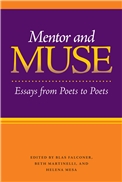“We make out of the quarrel with others, rhetoric, but of the quarrel with ourselves, poetry. While William Butler Yeats’s famous formulation is gorgeously and almost convincingly mellifluous, as is the case with so many declarations about poetry in general, it simply is not true: many poems are arguments composed specifically to quarrel with others.”
So begins my essay, “The Quarrelsome Poem,” just published in Mentor and Muse: Essays from Poets to Poets, edited by Blas Falconer, Beth Martinelli, and Helena Mesa (Carbondale, IL: Southern Illinois University Press, 2010).
Mentor and Muse is a terrific collection of truly instructive yet delightfully idiosycratic reflections and writing prompts from a diverse group of 29 poets, including Claire Kageyama-Ramakrishnan, Mira Rosenthal, Phillis Levin, A. Van Jordan, Elline Lipkin, Diane Thiel, Nancy Eimers, Maria Melendez, William Olsen, and Kevin Prufer. It’s an honor to have my own work included with theirs.
In “The Quarrelsome Poem,” I define a kind of structure I call “the cliche-and-critique structure.” As the name indicates, the cliche-and-critique structure “first reveals a problematic, cliched representation and then turns to provide an alternative to that troublesome, overused language.”
There’s a page on the cliche-and-critique structure on this blog (here) that offers reading supplemental to “The Quarrelsome Poem”; however, the essay in Mentor and Muse goes into much greater detail about the structure, both its demands and the great assistance it can offer a working poet. Additionally, the essay offers in full the terrific “I Don’t Want to Slam,” by Staceyann Chin, one of the great cliche-and-critique poems, but one not readily available online. And, of course, as hinted at in my opening to this post: I tried to make my own essay an example of cliche-and-critique writing.
So, check out “The Quarrelsome Poem,” and, of course, the totality of Mentor and Muse…much, much, much good stuff there.
